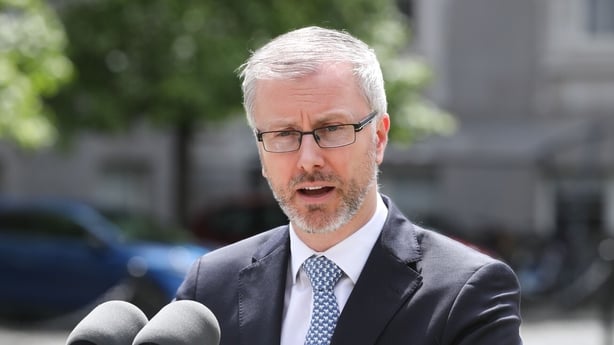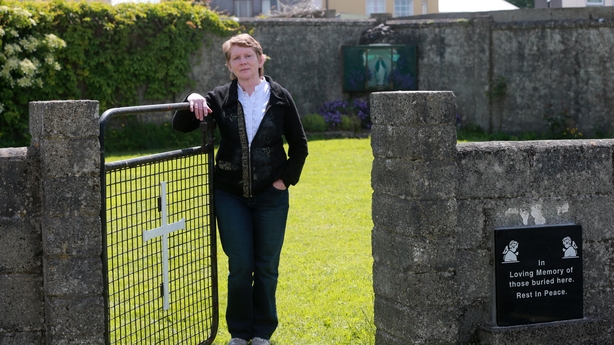Minister for Children Roderic O'Gorman has said that Daniel MacSweeney will be in charge of the independent office to lead an excavation at the site of the former mother and baby home in Tuam, Co Galway.
Mr MacSweeney will head up the independent office that was established under the Institutional Burials Act to oversee that children's remains at the site are recovered and re-interred in a respectful and appropriate way.
Mr MacSweeney worked for the International Committee of the Red Cross from 2007 to this year in various roles, and most recently as the ICRC Envoy on Missing Persons in the Caucasus, which focused on the work to clarify the fate of over 2,300 people unaccounted for after conflicts in the 1990s and 2008.
Mr O'Gorman said Mr MacSweeney has "great experience" and that he would be in charge of the initial works on site, the protection and preservation of the site, and initiating the excavation.

He said he had "no doubt" Mr MacSweeney would "work as expeditiously as possible" but also that the excavation takes place "in a way that ensures the best results ultimately for families of former residents can be achieved".
Speaking on RTÉ’s News at One, the minister described it as a "deeply complex operation" and "one of the most complicated forensic excavations in the world taking place".
He said there had not been an collection of DNA of family members yet, and that Mr MacSweeney's initial engagements "today and over the next number of weeks" will be with families and relatives of survivors or former residents "prior to him engaging with the media".
He said Mr MacSweeney would be "best placed" to provide families with an indication of the timelines that he will be working to and that the agency is established for a five-year period and will be funded by his department for each of the years.
Asked what will happen about sites at Bessborough in Cork and Seán Ross Abbey in Tipperary, Mr O'Gorman said the legislation that was passed last year "does allow a similar agency be established for other sites if the criteria set out in the legislation is met".
On the question of possible death inquests, he said the legislation was designed so the coroner for the area covering Tuam will have full access to all information "coming from the site" and will be able to "intervene at any point if they feel it's necessary".
The minister has also secured approval to engage Sheila Nunan to act on his behalf in leading the process of negotiation will all religious bodies who had a historical involvement in mother-and-baby homes.
A former teacher and school principal, Ms Nunan was General Secretary of Irish National Teachers' Organisation between 2009-2019.
He said his department was "looking to engage someone with the degree of negotiation experience that Sheila Nunan has to progress those engagements with these congregations".
Mr O'Gorman said he met "a number" of the congregations and set out his belief that a "meaningful contribution was needed from them and now we're looking to progress those engagements".
We need your consent to load this rte-player contentWe use rte-player to manage extra content that can set cookies on your device and collect data about your activity. Please review their details and accept them to load the content.Manage Preferences
'An atrocity right from the start' - Corless
It is more than ten years since historian Catherine Corless began her research into the Tuam home, where she established that nearly 800 children, who had been born there, had died and were probably buried in a septic tank in the grounds of the institution.
The intervention at the site will involve the excavation, recovery, analysis, identification - if possible - and re-interment of the children's remains located at the site.
Read more: Director sought to oversee Tuam mother-and-baby home exhumations
Speaking on RTÉ's Morning Ireland, Ms Corless said Minister O’Gorman notified survivors and interested parties yesterday about today's announcement.
She said it was good to hear that finally something is going to happen.
"It's just been dragging on for so, so long", she said.
Knowing that a family member is buried in a sewage system which was reused as a burial place for illegitimate children is "just heartbreaking" for relatives, she said.
"It was an atrocity right from the start," Ms Corless said.
"When I found out back in 2014, I just couldn't understand why something didn't happen immediately, and especially in 2017, when it was discovered that these were the 'home babies’ that were buried there from the time the home was up and running.
"And I thought then that there would be immediate action and the archaeologists at the time, who discovered the bones, they said that within six months, they said, you must take those remains out of here.
"This is five, six years later and nothing has happened yet, but I suppose it's good that it will happen.
"And that was my focus all along, just to get those babies out and just to give them a decent Christian burial."

Ms Corless said that there are remarkable resources in DNA and "there's no doubt remains can be identified, as we know, sometimes remains from over 100 years or more".
"They can find out a lot and I don't think there's any problem as long as there is enough remains left of the child and there shouldn't be any problem in identifying them," she said.
Ms Corless added that the survivors and families today want the remains of that child back.
"Just to place the child with their mother and this will bring relief to them and will bring closure, so it's a good day that that director has been brought on the scene and that things will happen from here out," she said.
Ms Corless said she understands that work will start happening shortly "and finally we will have closure".
